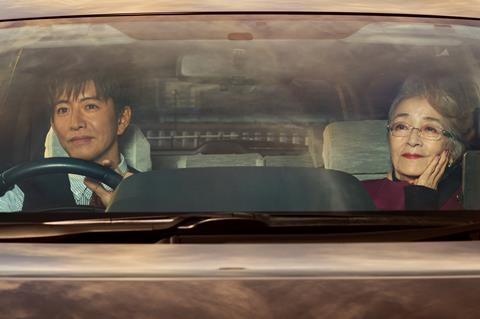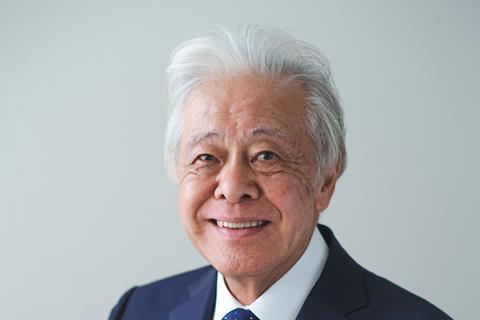
As it nears its fourth decade, Tokyo International Film Festival (TIFF) continues to evolve in its sixth year under the leadership of chairman Hiroyasu Ando. The upcoming 38th edition, which runs from October 27 to November 7, continues to build on long-term objectives outlined by Ando including a focus on gender equality, the nurturing of young talent and fostering a strong inter-Asia filmmaking network.
“It doesn’t make much sense for us to try to copy festivals like Cannes or Venice, which have well over a half century of history,” Ando tells Screen. “On the other hand, Tokyo is a part of Asia, which is filled with countries that are developing rapidly. That kind of modern dynamism, as well as modern concerns, can make for great art. We decided to position TIFF as a place for discovering and supporting that kind of cinema.”
The festival will screen 183 films and includes a 15-strong Competition section, of which eight are world premieres.
These include Mother Bhumi from Malaysia’s Chong Keat Aun, starring Fan Bingbing; documentary We Are The Fruits Of The Forest from Cannes and Berlinale award-winner Rithy Panh; and Mothertongue by China’s Zhang Lu, fresh from winning best film at Busan with Gloaming In Luomu.
The festival continues its commitment to gender equality – it was the first Asian film festival to sign onto the Collectif 50/50 gender parity pledge in 2021 – with its Women’s Empowerment section, now in its second year.
Programmed by Andrijana Cvetkovikj, this year’s strand includes multiple talk sessions, including one centred around women producers on the global stage like Chieko Murata (Kokuho), Eiko Mizuno Gray (Renoir) and Eriko Miyagawa (Shogun).
One of Ando’s ambitions is to make TIFF a stronger platform for face-to-face networking and communication, a plan delayed by the Covid pandemic. This year’s festival will feature more parties “on a small, medium and large scale,” including ones sponsored by Vietnam, Chile, Italy and the US’s Motion Picture Association.
“We think it’s important to create a casual space for international exchange for our guests from Japan and around the world,” says Ando. “People getting to know each other, discussing co-productions, and traveling back and forth to make films together—I believe that’s the crucial role of an international film festival.”
Generations young and old
The festival’s pivot to Asia and its renewed focus on nurturing young talent converge in its newest section, the Asian Students’ Film Conference. It comprises three programmes of short films collected from film schools around Asia. The programme was funded by the Tokyo Metropolitan Government after a recommendation from Palme d’Or winning-director Hirokazu Kore-eda.
The emphasis on the region is also evident in the lineup for this year’s TIFF Lounge, a series of live talk sessions between filmmakers. This year’s pair-ups include Lee Sang-il (Kokuho) and Yoji Yamada (TIFF centrepiece film Tokyo Taxi), Akio Fujimoto (Lost Land) and Pen-ek Ratanaruang (Morte Cucina), Sho Miyake (Two Seasons, Two Strangers) and Rithy Panh (We Are the Fruits of the Forest), and Hirokazu Kore-eda (upcoming Sheep In The Box) and Chloe Zhao (TIFF closing film Hamnet).
This year’s lifetime achievement awards will be presented to two Japanese cinema veterans: actor Sayuri Yoshinaga, who debuted in the late 1950s and whose leading role in TIFF opening film Climbing for Life marks her 124th appearance; and director Yamada Yoji, who has helmed 91 films including the long-running Tora-san series and centrepiece film Tokyo Taxi.
“Ms. Yoshinaga has been a superstar for decades, and to me, her achievements as an actor resonate with the person she plays in the film, Junko Tabei, the first woman to climb Mount Everest,” says Ando.
An issue on the minds of filmmakers and film festivals alike is the use of artificial intelligence. Ando says that Japan has been slower to seriously debate its impact on cinema than the West, but that discussions are now beginning to take shape in Japan in general and TIFF in specific.
“It’s becoming a part of our everyday lives, and something we as a festival can’t ignore. While we don’t have any specific symposiums on it this year, it’s something we’re thinking about seriously for next year,” says Ando.
Looking back on his first five years as chairman of the festival, Ando counts as his biggest successes to date the move from Roppongi to the Hibiya-Ginza area in 2021, as well as appointing Shozo Ichiyama, formerly of Tokyo Filmex and a producer of films by directors like Jia Zhang-ke and Hou Hsiao-Hsien, as programming director.
“Ichiyama has strong relationships with people overseas, and he views films with that international perspective. I think his international network has helped improve our film selection,” says Ando.
Challenges

In terms of challenges for the festival, Ando cites the budget, which is made up of a combination of government support and corporate sponsorship. There have been positive moves: this year’s budget exceeds ¥1bn (~$6.7 million) for the first time, up from ¥800m ($5.2m) when Ando came in as chairman, due to the addition of eight new sponsor firms. Furthermore, this year’s crowdfunding campaign, for which backers receive tickets to the red carpet ceremony, brought in ¥25m ($166,000), up from ¥17m ($113,000) last year.
“Still, our budget is small compared to festivals like Busan and Beijing, not to mention Cannes and Berlin,” says Ando. “It’s not as if more money necessarily means a better festival, but I do believe we need to further increase the budget.”
Another goal for the future is to better let the general public know that the festival is open to regular filmgoers, a perennial problem for TIFF.
“When we conduct surveys, some people ask us, ‘Wait, you can buy tickets for the festival?’ There seems to be an idea out there that only certain people are allowed to participate, that it’s an industry-specific event. To that end, we need to improve our public relations and messaging.”
Another goal of Ando’s is to move TIFF’s date to better compete for titles with autumn festivals like Busan and San Sebastian. However, the dual realities of Japan’s climate and economics make it a challenge: September is typhoon-heavy and muggy, while spring brings cherry blossoms but also marks the beginning of Japan’s fiscal year, making holding a festival near impossible from a budgetary standpoint.
“There are various challenges to moving the date, but it’s something I’d like to accomplish at some point,” says Ando.
















![[L-R]: Amanda Villavieja, Laia Casanovas, Yasmina Praderas](https://d1nslcd7m2225b.cloudfront.net/Pictures/274x183/6/4/1/1471641_pxl_20251224_103354743_618426_crop.jpg)








No comments yet